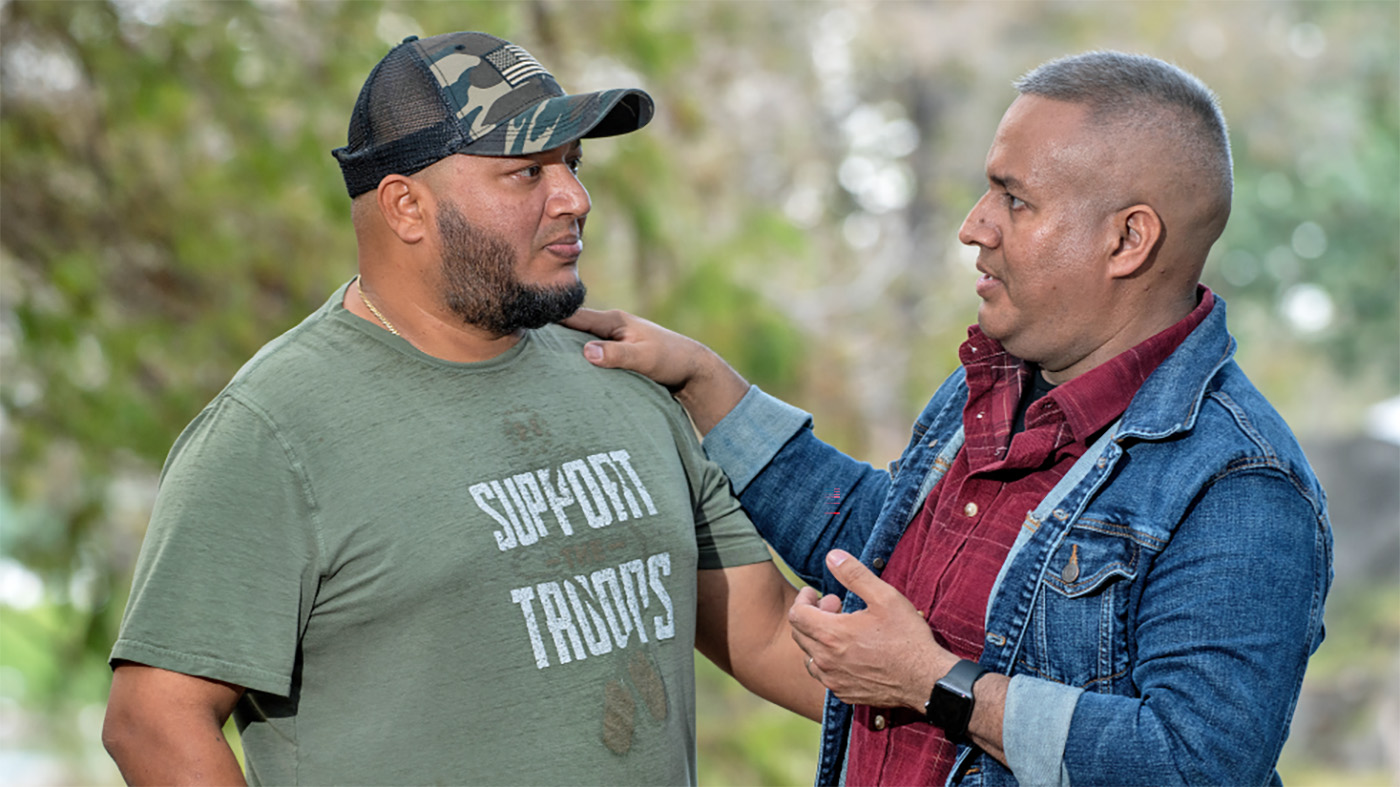If you or a Veteran loved one attempted suicide, you may be feeling a range of emotions. You also may have many questions about the future and what to do now. It can be hard to know where to begin, but you’re not alone.
There are steps you can take and resources available to guide you through this journey of hope and healing.
1. Find support after a suicide attempt
No matter if you’re a Veteran or if you’re supporting a Veteran in your life, VA is here for you. We offer a range of resources and a network of support to help you navigate this difficult time:
- Our Coping and Support website offers guides and links for what you should know about coping with a suicide attempt.
- VA suicide prevention coordinators (SPCs), located at VA medical centers across the country, can connect you with resources and programs to help in your healing process. Find your local SPC at VeteransCrisisLine.net/Get-Help/LocalResources.
- You can search for local support groups through the Suicide Awareness Voices of Education (SAVE) and the American Foundation for Suicide Prevention websites.
2. Learn how to talk with children about suicide
If there has been a recent suicide attempt in your family, this could be one of the toughest experiences you and your children may ever face.
Our Talking to Kids About Suicide guide is intended to provide you with support and resources that may be helpful now and as your family recovers. The guide, which covers age groups from preschool through the teen years, isn’t intended to replace professional mental health advice. It may be best to use this along with professional support if you or your child is struggling with how to talk about this difficult subject.
Find information related to:
- Why talking about a suicide attempt is important.
- Ideas about when you should talk about an attempt.
- Ideas on how much information to share.
- Ways to support a child (preschooler, school age and teenager).
- Examples on what to say and how you might say it.
3. Become familiar with short-term steps you can take
For a family member, caregiver or friend, a loved one’s suicide attempt can come with many mixed emotions, including fear, anger and confusion. There are tangible steps you can take to guide you and your loved one in the short term, directly following the attempt, and in the long term.
Short-term steps:
- Complete a release of information form to allow you to participate in your loved one’s medical or mental health care.
- Meet with the treatment team and develop a plan for the patient to receive follow-up care after discharge.
- Bring a list of all medications taken by the patient when you meet with the treatment team.
- Ask about conditions that are being treated and what medications are being prescribed.
- Talk about secure storage strategies of guns and medications in the home.
- If receiving services at a VA location, ask how to connect with the VA SPC.
- Request a copy of the patient’s safety plan prior to leaving the facility.
- Ensure all follow-up appointments are scheduled prior to discharge and keep your contact information up to date in your loved one’s medical record.
- Add the Veterans Crisis Line number (Dial 988 then Press 1) to your phone and encourage your loved one to do the same.
4. Become familiar with long-term steps you can take
As you prepare to take your Veteran loved one home from treatment:
- Know the warning signs of suicide.
- Keep the safety plan handy and discuss it as often as needed.
- Communicate with your loved one about any swift mood changes and reach out to medical providers with any concerns.
- Explore VA programs such as Peer Support, Whole Health, Care Management and VA Chaplains.
5. Remember to take care of yourself
If you’re a friend, family member or caregiver, remember caring for yourself is key to caring for others. You can find information on how to stay safe and healthy with our Suicide Prevention Toolkit for Caregivers and by visiting Caregiver.VA.gov.
Life has its storms. You don’t have to navigate them alone. That’s true whether it’s an everyday struggle or something more complicated. VA provides extensive resources for many of life’s challenges at Don’t Wait. Reach Out.
If you’re a Veteran in crisis or concerned about one, contact the Veterans Crisis Line to receive 24/7 confidential support. You don’t have to be enrolled in VA benefits or health care to connect. To reach responders, Dial 988 then Press 1, chat online at VeteransCrisisLine.net/Chat, or text 838255.
As a family member or friend of a Veteran, you can play an important role in providing support for their recovery. If you’re a Veteran who attempted suicide, you’re not alone—there are people who care about you and want to help.
Topics in this story
Link Disclaimer
This page includes links to other websites outside our control and jurisdiction. VA is not responsible for the privacy practices or the content of non-VA Web sites. We encourage you to review the privacy policy or terms and conditions of those sites to fully understand what information is collected and how it is used.
More Stories
Veteran Byron Potier weighed almost 300 pounds and was tired and lethargic. He was the perfect candidate for gastric sleeve surgery.
How much do you know about VA care, benefits and services? Don’t miss out on what you've earned—check out the "2025 VA Federal Benefits Guide for Veterans, Dependents, Survivors, and Caregivers" handbook to learn more.
Feeling stressed? Your breath can help you relax and focus. Take 3 minutes to reset and prioritize your well being for this week's #LiveWholeHealth practice.






